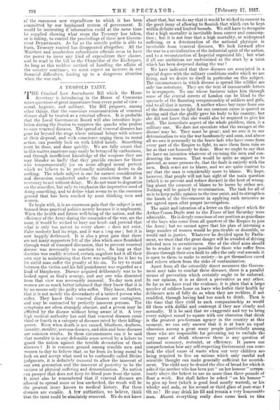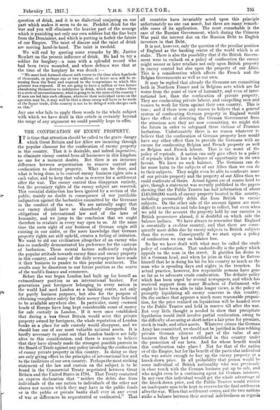A TWOFOLD TAINT.
THE Criminal Law Amendment Bill which the Home Secretary is introducing in the House of Commons raises questions of great importance from every point of view— moral, hygienic, and military. The Bill proposes, among other things, that the conscious communication of venereal disease shall be treated as a criminal offence. It is probable that the Local Government Board will also introduce legis- lation during the Session to suppress the quacks who profess to cure venereal diseases. The spread of venereal diseases has gone far beyond the stage where rational beings with science at their disposal, and with conscience urging them to moral action, can possibly look on with foldeehands. Something must be done, and done quickly. We are fully aware that in this matter amateurs may easily be betrayed by enthusiasm, and through insufficient knowledge of the weapons they use may blunder so badly that they provide excuses for those who temperamentally (or on some alleged moral pretext hich we believe to be profoundly mistaken) desire to do nothing. The whole subject is one for earnest consideration and discussion conducted under the conviction that it is necessary to act without delay. We do not want to dogmatize on the remedies, but only to emphasize the imperative need of doing something, and to define what seems to us the common ground that has been reached by most thinking men and women. _ To begin with, it is an enormous gain that the subject is not banned from practical politics merely because it is unpleasant. When the health and future well-being of the nation, and the efficiency of the Army during the remainder of the war, are the issue, it would be wicked to bury our heads and pretend that what is only too patent to every obsen • r does not exist. False modesty had its reign, and it was a long one but it is now happily dethroned. It is also a great gain that there are not many supporters left of the idea which once flourished through want of reasoned discussion, that to prevent venereal disease was necessarily to sanction vice. So long as that doctrine was readily received, certain mqralists had it all their own way in maintaining that there was nothing for it but to let sinful man suffer the penalty of his sin. To try to stand between the victim and his full punishment was regarded as a kind of blasphemy. Disease acquired deliberately was to be looked upon as God's scourge, and any one who dissented from that view was necessarily immoral. To-day men and women are so much better informed that they know that it is by no means only the guilty who suffer. They know, further, that it is not merely the descendants of a tainted person who suffer. They know that venereal diseases are contagious, and may be contracted by perfectly innocent persons. The symptoms are often strangely obscure, and a person may be Alicted by the disease without being aware of it. A very high medical authority has said that venereal diseases come third or fourth in a category of diseases rated by their killing- power. Even when death is not caused, blindness, deafness, insanity, sterility, nervous diseases, and skin and bone diseases are common results. In these circumstances can it be said that morality is in any defensible sense served by a failure to guard the nation against the terrible devastation of these diseases ? It is common ground among sensible men and women to-day to believe that, so far from its being moral to look on and accept what used to be confusedly called Divine judgments, it is definitely immoral to allow the innocent of our own generation and the innocent of posterity to be the victims of physical suffering and demoralization. No nation can prosper that does not keep its blood pure from the taint. It must also be remembered that if venereal diseases are allowed to spread more or less unchecked, the result will be the greatest irony known to medical history. For these diseases arc curable. A few authorities, we believe, think that the taint could be absolutely removed. We do not know about that, but we do say that it would be wicked to consent to the great irony of allowing to flourish that which can be kept within definite and limited bounds. We still-have to teeognize that a high mortality is inevitable from cancer and consunip- tion ; but it is not true that a high mortality, or widespread suffering, or a deterioration of the national physique is inevitable from venereal diseases. We look forward after the war to a revitalization of the industrial spirit of the nation, and to a reconstruction of Imperial organized life ' • but what if all our ambitions are undermined at the start by a taint which has been deepened during the war !
We have indicated that these diseases are associated in a special degree with the military conditions under which we are living, and we desire to dwell in particular on this subject. The circumstances in which disease is spread like wildfire are only too notorious. They are the text of innumerable letters to newspapers. No one whose business takes him through some of the central streets of London can be blind to the spectacle of the flaunting companionship of soldiers and girls, and to all that it means. A mother whose boy came from one of the Dominions to fight for our common cause is quoted as having said that she gladly-gave his body to his country, but she did not know that she would also be required to give his soul. The immediate aspect of the whole problem, then, is a military one. We dare not speculate what the ravages of the disease may be. They must be great ; and we owe it to our determination to win the war handsomely and soon, and above all we owe it personally to the brave lads who have come from every part of the Empire to fight, to save them from ruin so far as that cam humanly be done. Here we ought to say that' we have no intention whatever of excusing the men and con- demning the women. That would be quite as unjust as to pretend, as some persons do, that the fault is entirely with the men. Both sexes are to blame, and we are quite content to say that the man is considerably more to blame. We hope,• however, that people will not lose sight of the main question (which is to prevent and reduce disease) in the heat of wrang- ling about the measure of blame to be borne by either sex. Nothing will be gained by recrimination. The task for all of us is to keep public opinion to the true point, and to strengthen the hands of the Government in applying such -measures as are agreed upon after proper investigation.
The spirit and intention of a letter on the subject which Sir Arthur Conan Doyle sent to the Times of last Saturday were admirable. He is deeply conscious of our position as guardians of the boys who come from all quarters of the Empire to join the Army • but we cannot agree that his plan of interning a large number of women would be practicable or desirable, or would end in justice. Whatever be decided upon by Parlia- ment, we trust that the great danger will be avoided of driving infected men to secretiveness. One of the chief aims should be to render it as easy as possible for those who suffer front disease through their own fault to offer the only real amends it is open to them to make to society—to get themselves cured and relieve others from the risks of contamination.
Apart from all the ostensibly direct measures the Govern- ment may take to combat these diseases, there is a parallel means of prevention which certainly ought to be enforced. In our opinion, it is as direct a preventive as any other. So far as we have read the evidence, it is plain that a large number of soldiers home on leave who forfeit their health by deliberate acts of folly do so when they are reckless, if not muddled, through having had too much to drink. Then is the time that they yield to such companionship as would fill them with dislike and contempt if they saw clearly and normally. If it be said that we exaggerate and try to bring. every subject round to square with our obsession that drink is the greatest pro-German agency in the country at this moment, we can only answer that it is at least an equal obsession among a great many people (particularly among those who are responsible for governing us) to exclude the very name of drink whenever there is any question of national economy, restraint, or efficiency. It passes our comprehension how any self-respecting Government can over-- look the chief cause of waste when our very children am being required to live on rations which only careful and scientific thought can make generally sufficient for nourish- ment. The child may be denied the slice of bread for which it asks if the mother who has been put on her honour " scrupu- lously obeys the behest to use no more than three pounds of flour a week. But shall father be asked " on his honour "• to give up beer (which is good food mostly wasted), or his whisky and soda, or his second or third glass of port-wine I Oh no ! He may drink his fill and remain a very honourable man. Almost everything really does -come back to this .question of drink, and it is no dialectical conjuring on our part which makes it seem to do so. Prohibit drink for. the 'war and you will eliminate the heavier part of the scourge which.is punishing not only our own soldiers but the fine boys from the Dominions, and which is putting in forfeit the future of our Empire. The taint of disease and the taint of drink are moving hand-in-hand. The taint is twofold.
We will end by quoting some remarks by Mr. Justice 'Rowlatt on the present influence of drink. He had to try a soldier for burglary—a man with a splendid record who had been twice wounded, and whose defence was that at the time of the burglary he was drunk We must look forward almost with terror to the time when hundreds of thousands, or perhaps one or two millions, of brave men will be re- turning from the front and exposed to the temptations to which this prisoner was exposed. If we are going to have a million or two heroes abandoning themselves to indulgence in drink, which may reduce them to a state of unconsciousness, what is going to be the state of the country ? if men are led into such offences, whatever their individual views on the question may be, it may well be that a clean sweep will have to be made of the liquor trade, if the country is not to be deluged with charges such 'a as this."
Any one who fails to apply these words to the whole subject with which we have dealt in this article is certainly beyond the range of any argument we could possibly hope to offer.



































 Previous page
Previous page